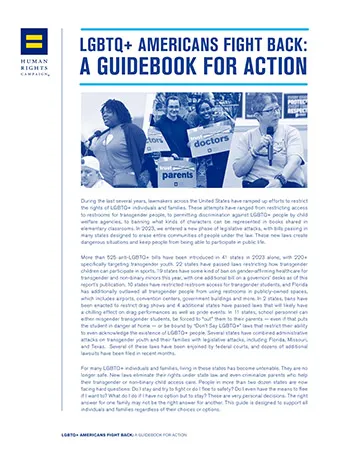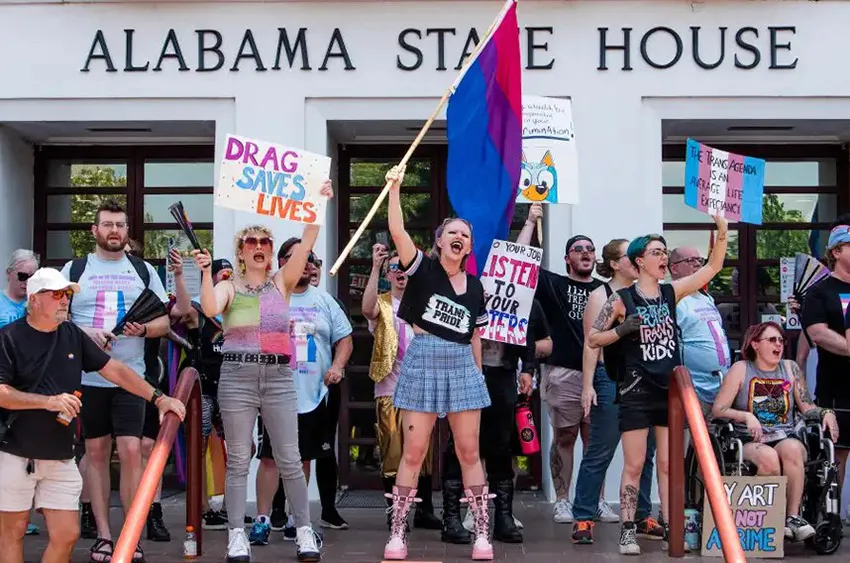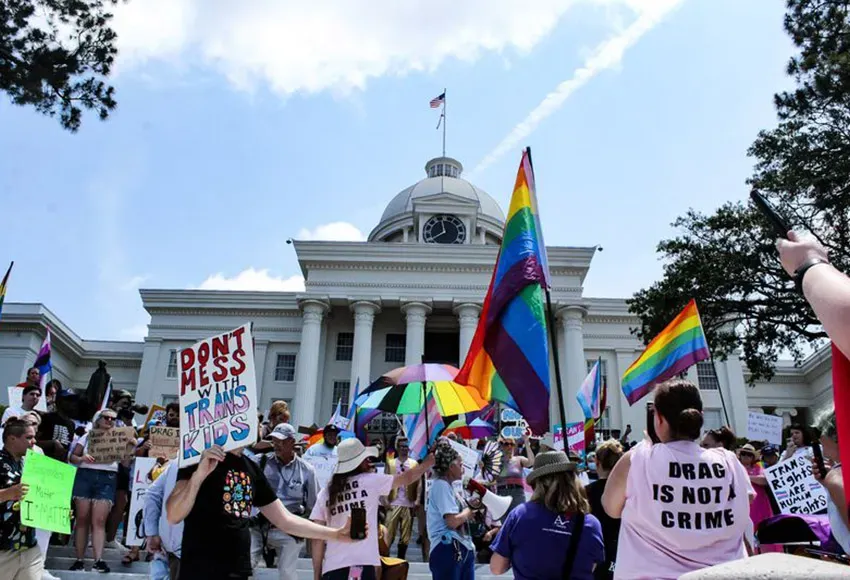On Tuesday, June 6, 2023, the Human Rights Campaign (HRC) declared that it now considers the United States under a national state of emergency for LGBTQ+ people. This is the first time the country's largest LGBTQ+ civil rights organization has made such a declaration in its nearly half-century history.

Official guidelines
Alongside the declaration, the HRC also released a free online guidebook that includes emergency and health resources, summaries of state laws, and resources for LGBTQ+ travelers and those living in "hostile states," including those looking to relocate. The guidebook also provides information on how to get involved with advocacy, file civil rights–violation complaints, and talk with anti-LGBTQ+ family and friends.
"LGBTQ+ Americans are living in a state of emergency. The multiplying threats facing millions in our community are not just perceived – they are real, tangible, and dangerous," HRC President Kelly Robinson said in an additional statement.
"In many cases, they are resulting in violence against LGBTQ+ people, forcing families to uproot their lives and flee their homes in search of safer states, and triggering a tidal wave of increased homophobia and transphobia that puts the safety of each and every one of us at risk."
Over 1,000 anti-LGBTQ+ bills in state legislatures
In its guidebook, the organization breaks down the reasoning behind its declaration. One of the main reasons backing the national emergency is the increase in proposed and passed legislation in 2023.
Since January, 41 states have seen 525 anti-LGBTQ+ bills introduced, with 220 of them specifically targeting Transgender people. As of June 5, more than 76 bills have passed into law.
The HRC found that all 525 bills fit into ten anti-LGBTQ+ categories: anti-Trans bathroom laws, forced outing, Religious Freedom Restoration Acts, anti-drag laws, Don't Say Gay, anti-Trans sports bans, gender-affirming care bans, LGBTQ+ erasure, prohibition of pronoun use, and other discriminatory bills.
The most commonly passed laws are those that affect Transgender youth. The HRC found that gender-affirming care bans have passed in 20 states. This legislation impacts 30.9% of all Transgender youth (aged 13–17).
Laws against Transgender athletes' participation in sports that align with their gender were passed in 21 states. An estimated 90,100 Transgender youth live in areas where laws dictate which sports teams they can play on.
The Human Rights Campaign warns against travel to Missouri, Florida, and Texas. It also notes that as lawmakers introduce anti-LGBTQ+ bills, there is a persistent rise in mental health issues in Queer and Trans people, especially children.

Reaching beyond youth
The HRC also noted a trend in anti-Trans laws slowly expanding beyond children. Florida's Don't Say Gay law, which first prohibited conversations around gender and sexuality in K-3 classrooms, now reaches up to 12th grade. The state has also passed new bans blocking critical race and gender studies courses at collegiate levels. Anti-Trans laws about athletics are starting to also creep up to the college level.
New laws regarding healthcare coverage are now blocking Trans adults from receiving gender-affirming care in some states as well. "In some states, care has been banned not only for youth but adults as well, especially through bans on public funds going to provide this best practice healthcare," the HRC statement said.
Minority views
The HRC emphasized in its statement that despite the record-breaking number of anti-LGBTQ+ laws in the United States, most Americans favor antidiscriminatory protections for the Queer and Trans community.
"These laws are fueled by an anti-LGBTQ+ Republican establishment – and coordinated, well-funded extremist groups like the Alliance Defending Freedom, the Heritage Foundation, and the Family Policy Alliance – insistent on trying to control our families and lives," Robinson said.
The organization found that it's not a coincidence that the language in so many of the anti-LGBTQ+ bills introduced to state legislators sounds eerily similar. "Many individual bills rely on copy-and-pasted language from model legislation proposed by a national coalition of groups," Robinson explained.
Five key lobbyist groups have been essential in passing anti-LGBTQ+ laws. The American College of Pediatricians, the American Principles Project, Gays Against Groomers, the Independent Women's Forum, and Moms for Liberty have all repeatedly traveled from state to state to sign petitions and speak in favor of these laws.
"These organizations use junk science and fear-mongering attacks against LGBTQ+ to peddle their policies and try to justify discrimination in the name of religious belief," Robinson said.
Legislators have been using the loud voices of these minority opinions to repeatedly echo the same complaints, creating the mirage that their concerns represent the majority of the American people.
Antidemocratic means
Due to gerrymandering, some districts have become more conservative. Therefore, the most successful candidates are those who can appeal to the more extreme Republicans in their district. "Because legislative districts have been drawn so unfairly, too many state legislators are not held accountable to their entire district in a general election. Instead, the most competitive elections these legislators face is in their primary election," Robinson continued.
Conservative legislators have also passed anti-Trans laws by successfully blocking and censoring colleagues who attempt to speak out against them. The HRC cites the removal of state Rep Zoey Zephyr in Montana and Rep. Maurie Turner in Oklahoma, and the expulsion of Tennessee state Reps. Justin Jones and Justin Pearson as examples of this.
It also notes the removal of peaceful demonstrators in Texas, Oklahoma, Nebraska, and Montana as an undemocratic form of repression.
Pulling strategies from the past
Anti-LGBTQ+ advocates have started leaning into a classic strategy reminiscent of the anti-Gay "Save Our Children" campaign made famous by Anita Bryant in the 1970s. The modern method sexualizes sexualities.
"They have so sexualized LGBTQ+ identity that they argue that even acknowledging that LGBTQ+ people exist – much less showing any affirmation of LGBTQ+ identity – is inherently inappropriate and corrupting for children," Robinson said.
Conservatives are also doubling down on "religious freedom" as a fundamental right and excuse for establishments and professionals to discriminate against LGBTQ+ people. Politicians use religious freedom to defend laws in states like Florida, which now give doctors and insurance agencies the right to deny care to Transgender patients if they do not morally agree with their "lifestyles."
The HRC notes that though religious freedom is used to discriminate against Queer and Trans people, it is not legal to discriminate against divorced or pregnant people, or those with opposing religious beliefs.
"There is an imminent threat to the health and safety of millions of LGBTQ+ people and families, who are living every day in uncertainty and fear," Robinson concluded. "Our number one priority will always be ensuring that LGBTQ+ people are safe and have the tools they need to defend and protect themselves against acts of hostility, discrimination, and – in the most extreme cases – violence."


